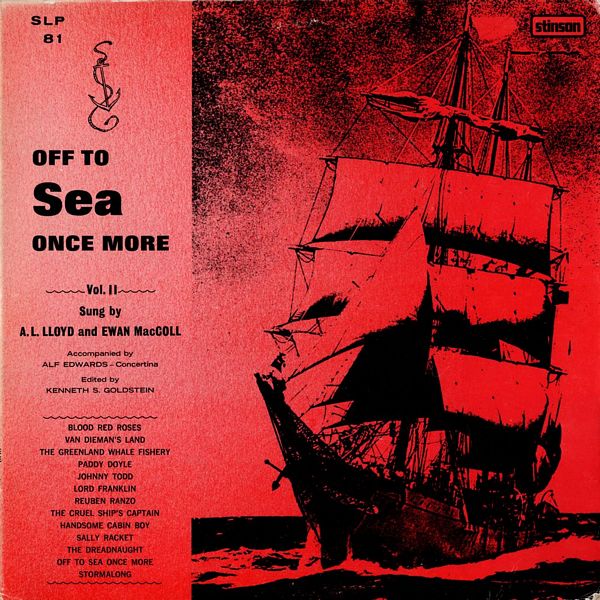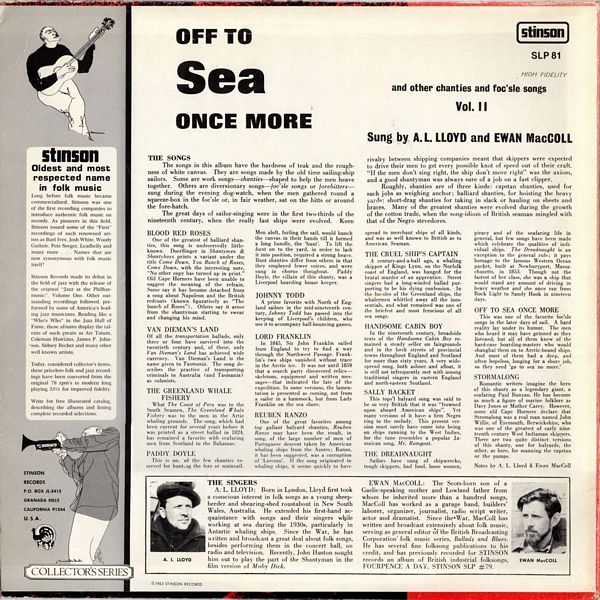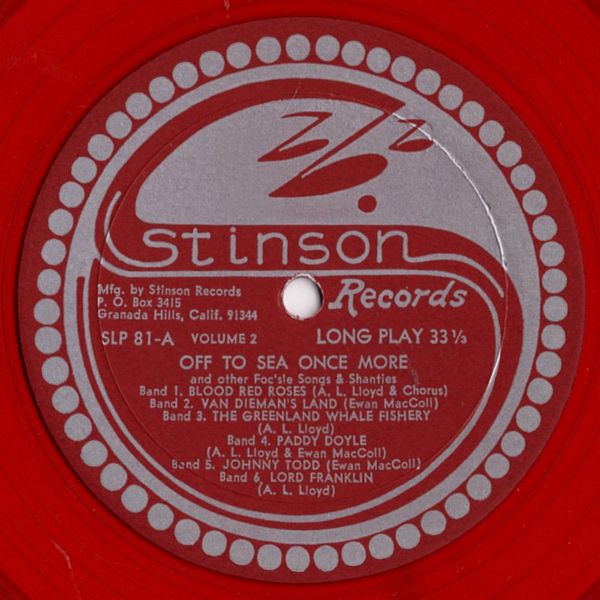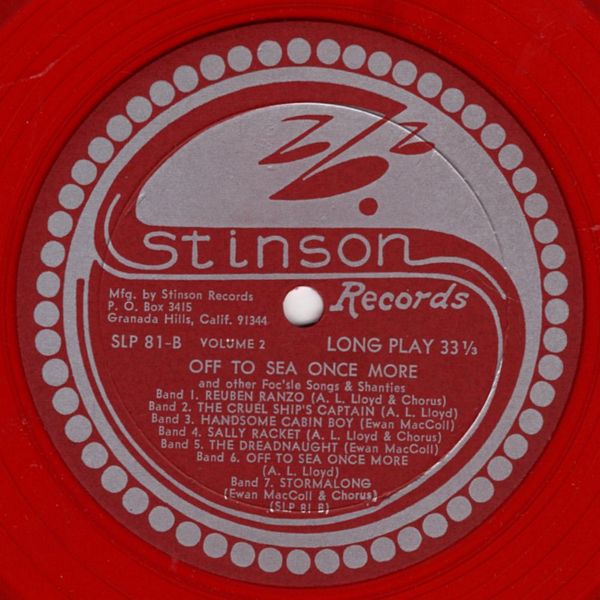

 |


 |
Sleeve Notes
THE SONGS
The songs in this album have the hardness of teak and the roughness of white canvas. They are songs made by the old time sailing-ship sailors. Some are work songs — shanties — shaped to help the men heave together. Others are diversionary songs — foc'sle songs or forebitters — sung during the evening dog-watch, when the men gathered round a squeeze-box in the foc'sle or, in fair weather, sat on the bitts or around the fore-hatch.
The great days of sailor-singing were in the first two-thirds of the nineteenth century, when the really fast ships were evolved. Keen rivalry between shipping companies meant that skippers were expected to drive their men to get every possible knot of speed out of their craft. "If the men don't sing right, the ship don't move right" was the axiom, and a good shantyman was always sure of a job on a fast clipper.
Roughly, shanties are of three kinds: capstan shanties, used for such jobs as weighing anchor; halliard shanties, for hoisting the heavy yards; short-drag shanties for taking in slack or hauling on sheets and braces. Many of the greatest shanties were evolved during the growth of the cotton trade, when the song-idiom of British seaman mingled with that of the Negro stevedores.
BLOOD RED ROSES — One of the greatest of halliard shanties, this song is undeservedly little-known. Doerflinger in Shantymen Shantyboys prints a variant under the title Come Down, You Bunch of Roses, Come Down, with the interesting note, "No other copy has turned up in print." Old Cape Homers have been unable to suggest the meaning of the refrain. Some say it. has become detached from a song about Napoleon and the British redcoats (known figuratively as "The bunch of Roses"). Others say it arose from the shantyman starting to swear and changing his mind.
VAN DIEMAN'S LAND — Of all the transportation ballads, only three or four have survived into the twentieth century and, of these, only Van Diemans Land has achieved wide currency. Van Dieman's Land is the name given to Tasmania. The song describes the practice of transporting criminals to Australia (and Tasmania) as colonists.
THE GREENLAND WHALE FISHERY — What The Coast of Peru was to the South Seamen, The Greenland Whale Fishery was to the men in the Artic whaling grounds. The song, which had been current for several years before it was printed as a street ballad in 1824, has remained a favorite with seafaring men from Scotland to the Bahamas.
PADDY DOYLE — This is one of the few shanties reserved for bunting the fore or mainsail. Men aloft, furling the sail, would bunch the canvas, in their hands till it formed a long bundle, the ‘bunt'. To lift the bunt on to the yard, in order to lash it into position, required a strong heave. Bunt shanties differ from others in that they employed fewer voices, and were sung in chorus thoughout. Paddy Doyle, the villain of this shanty, was a Liverpool boarding house keeper.
JOHNNY TODD — A prime favorite with North of England sailors in the mid-nineteenth century, Johnny Todd has passed into the keeping of Liverpool's children, who use it to accompany ball-bouncing games.
LORD FRANKLIN — In 1845, Sir John Franklin sailed from England to try to find a way through the Northwest Passage. Franklin's two ships vanished without trace in the Arctic ice. It was not until 1859 that a search party discovered relics — skeletons, equipment and written messages — that indicated the fate of the expedition. In some versions, the lamentation is presented as coming, not from a sailor in a hammock, but from Lady Franklin on the sea shore.
REUBEN RANZO — One of the great favorites among top gallant halyard shanties, Reuben Ranzo may have been the result, in song, of the large number of men of Portuguese descent taken by American whaling ships from the Azores; Ranzo, it has been suggested, was a corruption of ‘Lorenzo'. If the song originated in whaling ships, it seems quickly to have spread to merchant ships of all kinds, and was as well known to British as to American Seaman.
THE CRUEL SHIP'S CAPTAIN — A century-and-a-half ago, a whaling skipper of Kings Lynn, on the Norfolk coast of England, was hanged for the brutal murder of an apprentice. Street singers had a long-winded ballad purporting to he his dying confession. In the foc-sles of the Greenland ships, the whalemen whittled away all the inessentials, and what remained was one of the briefest and most ferocious of all sea songs.
HANDSOME CABIN BOY — In the nineteenth century, broadside texts of the Handsome Cabin Boy remained a steady seller on fairgrounds and in the hack streets of provincial towns throughout England and Scotland for more than sixty years. A very widespread song, both ashore and afloat, it is still not infrequently met with among traditional singers in eastern England and north-eastern Scotland.
SALLY RACKET — This tops'l halyard song was said to be so very British that it was "frowned upon aboard American ships". Yet many versions of it have a firm Negro ring to the melody. This present version must surely have come into being on ships running to the West Indies, for the tunc resembles a popular Jamaican song, Mr. Ramgoat.
THE DREADNAUGHT — Sailors have sung of shipwrecks, tough skippers, bad food, loose women, piracy and of the seafaring life in general, but few songs have been made which celebrate the qualities of individual ships. The Dreadnought is an exception to the general rule; it pays homage to the famous Western Ocean packet, built at Newburyport, Massachusetts, in 1853. Though not the fastest of her class, she was a ship that would stand any amount of driving in heavy weather and she once ran from Rock Light to Sandy Hook in nineteen days.
OFF TO SEA ONCE MORE — This was one of the favorite foc'sle songs in the later days of sail. A hard reality lay under its humor. The men who heard it may have grinned as they listened, but all of them knew of the hard-case boarding-masters who would shanghai them on to Arctic-bound ships. And most of them had a deep, and often hopeless, longing for a shore job, so they need ‘go to sea no more.'
STORMALONG — Romantic writers imagine the hero of this shanty as a legendary giant, a seafaring Paul Bunyan. He has become as much a figure of marine folklore as Davy Jones or Mother Carey. However, some old Cape Horners declare that Stromalong was a real man named John Willis, of Eyemouth, Berwickshire, who was one of the greatest of early nineteenth century West Indiaman skippers. There are two quite distinct versions of this shanty, one for halyards, the other, as here, for manning the capstan or the pumps.
Notes by A. L. Lloyd. & Ewan MacColl
THE SINGERS
A. L. LLOYD: Born in London, Lloyd first took a conscious interest in folk songs as a young sheep-herder and shearing-shed roustabout in New South Wales, Australia. He extended his first-hand acquaintance with songs and their singers while working at sea during the 1930s, particularly in Antarctic whaling ships. Since the War, he has written and broadcast a great deal about folk songs, besides performing them in the concert hall, on radio and television. Recently, John Huston sought him out to play the part of the Shantyman in the film version of Moby Dick.
EWAN MacCOLL: The Scots-born son of a Gaelic-speaking mother and Lowland father from whom he inherited more than a hundred songs, MacColl has worked as a garage hand, builders' laborer, organizer, journalist, radio script writer, actor and dramatist. Since the War, MacColl has written and broadcast extensively about folk music, serving as general editor of the British Broadcasting Corporation folk music series, Ballads and Blues. He has several fine folksong publications to his credit, and has previously recorded for STINSON records an album of British industrial folksongs, FOURPENCE A DAY, STINSON SLP #79.